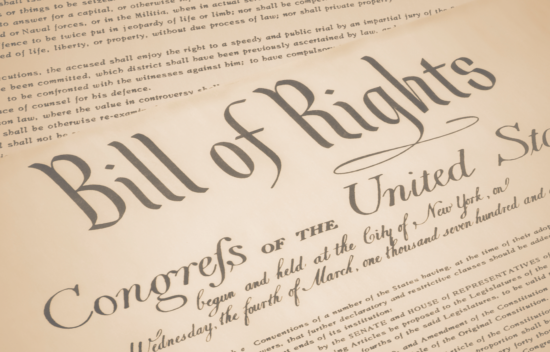



Bill of Rights Day
8 items

Bill of Rights: 10 Amendments
Primary Source - 821 Words
Primary Source
821 Words
The first 10 amendments to the Constitution make up the Bill of Rights. James Madison wrote the amendments, which list specific prohibitions on governmental power, in response to calls from several states for greater constitutional protection for individual liberties.

Origins and Purposes of the Bill of Rights | BRI’s Homework Help Series
Video
Video
6 Min
Why did the Founders see the need to create a Bill of Rights in addition to the US Constitution? What historical documents and events influenced them as they drafted it? The Virginia Declaration of Rights written by James Madison, the Magna Carta, the Petition of Rights, the English Bill of Rights, and the Massachusetts Body of Liberties.
The Founders included both concepts of democracy and republic in the blueprint for American government. Democracy protected majority rule whereas the idea of a republic protected individual citizens. The Bill of Rights was an important addition to the Constitution because it helped to guarantee individual rights. As a fluid document, inclusions to the Bill of Rights like the 14th Amendment brought the idea of incorporation, the process of states being held liable to uphold the Bill of Rights on the state level.
This latest installment in our Homework Help series explores these important constitutional questions.
6 Min

What Are the Origins of the Bill of Rights?
Lesson - 4 Activities
Lesson
4 Activities
60 Min
How did the the events and philosophies from British and colonial history shape the Founders' ideas about natural rights as well as the rights of Englishmen? How do these rights affect our daily lives in a free society?
60 Min

The Creation of the Bill of Rights
Lesson - 3 Activities
Lesson
3 Activities
How does the Bill of Rights protect individual liberties and limit the power of government? How is this seen in our everyday lives?

Preserving the Bill of Rights
Curriculum - 41 Lessons
Curriculum
41 Lessons
Preserving the Bill of Rights teaches students Constitutional principles by examining primary source documents and significant Supreme Court cases. In addition, each unit features expanded classroom activities engaging students with the Bill of Rights and the responsibilities of citizenship. Students will understand the connection between current events and the Bill of Rights when they participate in activities such as writing letters to their elected representatives; serving in a mock jury; creating public service announcements; and writing model laws.

The Bill of Rights – Docs of Freedom
Lesson - 6 Activities
Lesson
6 Activities
The Anti-Federalists had many objections to the Constitution, and one of them was that it did not have a bill of rights. Madison was worried that listing some rights would leave those rights that weren’t listed more vulnerable to infringement. But Jefferson put aside Madison’s concerns about the risks of a partial listing of rights, arguing, “Half a loaf is better than no bread. If we cannot secure all our rights, let us secure what we can.” Amid the drama of the ratification debate, Madison promised to introduce amendments in Congress. The Bill of Rights, a list that would serve to clarify and emphasize the limited nature of the national government, was ratified and added to the Constitution in 1791.

The Supreme Court and the Bill of Rights
Lesson - 3 Activities
Lesson
3 Activities
How has the Supreme Court decided cases in controversies related to the Bill of Rights?

Why A Bill of Rights? What Impact Does It Have?
Lesson - 3 Activities
Lesson
3 Activities
45 Min
The debate over the Bill of Rights at the Founding was not an argument over whether rights exist, but about how best to protect those rights. The Founders disagreed about whether a bill of rights was necessary, and whether it would be effective. Later generations continue to face the challenge of finding the best way to safeguard individual rights. This lesson explores these debates and discussions.
45 Min